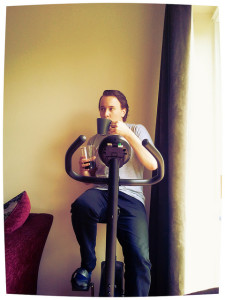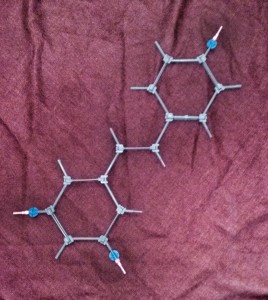Last summer, research by University of Copenhagen researchers published in The Journal of Physiology claimed that resveratrol supplements negate the cardiovascular benefits of exercise in adult men. Later that fall, a letter published in The Journal of Physiology took great disagreement with the overall conclusions made by the Copenhagen researchers based upon the results obtained and presented their objections. I summarized this rebuttal letter by James M. Smoliga and Otis L. Blanchard, which you may read by clicking this link.
As I’ve mentioned in the past, one of the great things about research is the fact that the questions and
research does not stop once an article has been published. Sometimes flawed studies make it through the peer-review process, resulting in calls for corrections, changes, or sometimes even retractions. Shameless plug somewhat related to the aforementioned statement: I just teamed up with Lewis Perdue to address major problems in a study unrelated to wine, but related to public health and exposure to endocrine disruptors. Please read that work here!As a refresher, or if you don’t feel like clicking on the link above, these are the issues that the first letter by Smoliga and Blanchard had with the Copenhagen study claiming resveratrol blunts the effects of exercise in adult men:
- The statement that resveratrol blunts most of the effects of exercise and produces mainly negative effects.
- The statement that resveratrol “did not affect the retardation of atherosclerosis”.
- The statement that “resveratrol supplementation caused a shift in vasoactive systems favoring vasoconstriction”.
- The statement that “resveratrol supplementation combined with exercise training induced a 45% lower increase in maximum oxygen uptake than training with placebo [i.e. control group]”.
- The statements attributing the differences between the “negative” results found in this human study with the “positive” results found in animals studies.
In the latest letter speaking in rebuttal of the Copenhagen study, researchers Thomas W. Buford (University of Florida College of Medicine) and Stephen D. Anton fully agreed with the points that were brought to light by Smoliga and Blanchard. In addition to agreeing with all five of the points addressed by Smoliga and Blanchard, they had additional points to raise regarding problems made by the Copenhagen researchers in coming to the strong conclusions that they did. In general, Buford and Anton felt as though the concluding statements and interpretations by the Copenhagen researchers were much too strong for several different reasons:
- The significant differences between resveratrol and placebo (control) groups was likely an artifact of the small group sizes (N=14).
- The example given was that LDL cholesterol was reported to significant decrease from 3.3 to 3.0mmol/L in the placebo group, while the reduction in the resveratrol group (from 3.6 to 3.4mmol/L), while very similar in magnitude, was reported as not significantly significant.
- Buford and Anton felt as though the difference between the resveratrol and placebo groups were not clinically relevant.
- Many intramuscular outcome measures related to vascular function as well as inflammation were
measured, though none of them showed any negative consequences as a result of resveratrol treatment.
- Buford and Anton pressed that these results do not support the strong conclusion that benefits of exercise were basically “cancelled out” by resveratrol treatment.
- Only healthy men were included in this study.
- Buford and Anton argued that if they men were already healthy, there isn’t much room for improvement regardless of treatment and any effects would be more difficult to detect (again, particularly with the small sample size).
- Antihypercholesterolaemia medications were not on the list of exclusion criteria.
- This medication has effects of altering cardiovascular and skeletal muscle functions.
- Two participants (treatment group unknown) were found to be taking these medications, thereby potentially adversely affecting the results of the study (especially since the sample size was so small).
- No information was given regarding how closely the subjects followed the experimental protocol, nor was there any indication that diet and exercise outside of study visits were monitored.
- Without controlling for outside influences that can affect cardiovascular health, one cannot be certain if the results found are due to the treatment, or perhaps due to the fact that more people in one group consumed a less healthy diet than the other group.
- The study neglected to mention that the resveratrol group showed significant improvements in the step test outcome measure compared with the placebo group.
- This study was stated to be a “test of maximum functional capacity”, so Buford and Anton were surprised that this positive result for the resveratrol group was not mentioned anywhere in the text and only shown briefly in a supplemental data table at the end of the document.
- The original study did say that both the resveratrol and the placebo groups saw improvement with the step test, though they neglected to mention that the results were significantly more improved in the resveratrol group compared with the control group.
- Buford and Anton expressed great concern regarding this oversight in the original paper’s conclusions, and felt as though it raised questions for them regarding the conclusions and how objective the analysis really was.
Concluding Thoughts
Buford and Anton bring up some important issues that were not initially addressed by Smoliga and Blanchard in their letter to the original Copenhagen researchers. After reading both letters, I have to agree with the researchers that the overall conclusions that resveratrol blunts or in simple terms “cancels
out” the benefits of exercise is just much too strong based on the reported results as well as the fact that the sample sizes were just much too small to make that sort of sweeping statement.
I would go so far as to call for an addendum to the paper, softening the conclusions a bit and stressing that further research to make conclusions on these results must be performed to help tease out some of the variability and improve on the failures and shortcomings of the reported experimental design and analysis.
Conflicts of interest disclosure: Stephen D. Anton is a scientific advisor and consultant for ReBody, LLC, a company that develops products containing resveratrol. Thomas W. Buford is a professor at the University of Florida College of Medicine and has no conflicts of interest to disclose.
Further reading:
- Buford, T.W., and Anton, S.D. 2014. Resveratrol as a supplement to exercise training: friend or foe? Journal of Physiology 592(3): 551-552.
- Gliemann, L., Schmidt, J.F., Olesen, J., Biensø, R.S., Peronard, S.L., Grandjean, S.U., Mortensen, S.P., Nyberg, M., Bangsbo, J., Pilegaard, H., and Hellsten, Y. 2013. Resveratrol blunts the positive effects of exercise training on cardiovascular health in aged men. The Journal of Physiology. Available online: doi:10.1113/jphysiol.2013.258061
- Smoliga, J.M., and Blanchard, O.L. 2013. (Letters) Recent data do not provide evidence that resveratrol causes ‘mainly negative’ or ‘adverse’ effects on exercise training in humans. The Journal of Physiology 591.20; 5251-5252.
- Yeamans, R.L. 2013 “Study Claiming Resveratrol Supplements Decrease the Cardiovascular Benefits of Exercise Challenged”. The Academic Wino.

![Photo by Carl Heinrich Bloch [Public domain], via Wikimedia Commons](http://www.academicwino.com/wp-content/uploads/2014/02/Samson-in-the-treadmill-The-Academic-Wino-191x300.jpg)

